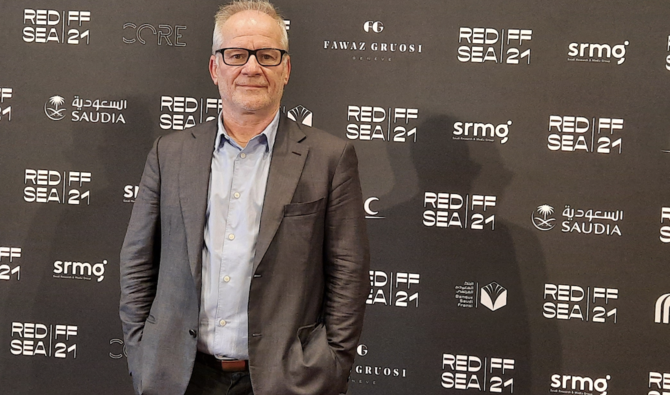JEDDAH: Cannes Film Festival chief Thierry Fremaux was among the movie industry heavyweights attending the first ever Red Sea International Film Festival, and his documentary, “Lumiere! The Adventure Begins,” was one of its highlights.
Fremaux’s film — one of 135 from 67 countries that premiered at the festival — tells the story of Auguste and Louis Lumiere, the French brothers who are credited with the first public presentation of a projected film in 1895. Over the next 10 years, they created more than 1,400 films, offering a unique picture of France at the turn of the 20th century.
Fremaux, who is in charge of artistic content at Cannes and also director of the Lumiere Institute in Lyon, spoke to Arab News en Francais.
Do you think the Red Sea Film Festival will influence film production in the Arab world?
I don’t know how the festival can influence production in the Arab world but if it can impact its own country, that will be the first step. I have only spent two days here, and based on personal experience I’m starting to realize that there are a lot of young filmmakers, a lot of young producers and young technicians who want to create projects.
Preparing a cultural event is a way of shedding light on this sector. After a couple or three editions of the festival, we will see how it will grow. Of course, it takes time and real proof of authenticity for the festival to find its own identity, which is not a replica of other festivals. I’m sure there is great potential.
Would a partnership with the Cannes Film Festival be possible in the future?
We will see if we can build a partnership. For the time being, my presence for this first edition is proof that Cannes is interested in this festival. No partnership proposals have been made and it is not like the Cannes Film Festival to come and impose itself. But I was invited and I came. This presence is also a way of telling other countries such as the US and certain countries in Europe that we are also heading toward Arab countries like Egypt and Saudi Arabia because things are moving. We are interested in all the world’s nations where there is cinema.
Right now, cinema is going through a delicate period due to the pandemic, the platforms, and many other factors. If I am screening the Lumiere film today, it is also to say that cinema is Lumiere’s finest invention.
The Lumieres made more than a thousand films, so how did you choose which ones to include in your documentary?
The Lumiere brothers shot and produced between 1,500 and 2,000 films. They were all short, one-minute films. The documentary is a montage of very well-known movies — like “Employees Leaving the Lumiere Factory” … “Baby’s Meal” and “The Arrival of a Train at Ciotat Station” — and is a way of telling the truth about some well-known stories and some unknown ones. It is also a way to help people discover many little treasures that show that the Lumiere brothers were inventors.
In the Lumiere brothers’ time cinema was silent, so what made you choose to add music and a voice-over?
There are two ways of showing the Lumiere movies. Today, I will exhibit them muted with my live comments. They are almost the same as in the film version, which were recorded along with music.
The tune is by Camille Saint-Saens, who was a French composer from the end of the 19th century and beginning of the 20th century — the Age of Enlightenment. This was the musical atmosphere of the era in which films were invented and created.
This film was a great success in France and among young people and students. Today, at the Red Sea International Film Festival, we saw students coming to watch it. Does it have an educational value?
Every film has an educational value, even great fiction movies.
This one is directed at young people and adults. It forces you to take the time, to watch, to imagine. To us, that was the challenge we wanted to take on. The movie was very successful and shown in many countries around the world. It’s a sign that audiences have patience, curiosity, interest, and that you don’t have to limit yourself to the Marvel movies. You can also watch the first movies in the history of cinema.
How can we support this sector?
By learning to make films in school. You can also learn to make them by watching movies. You have to edit films and help with the production. We have a very efficient system in France, an ecosystem to ensure that cinemas survive and prosper. Cinema is not dead: It can be witnessed here at the Red Sea International Film Festival.

































